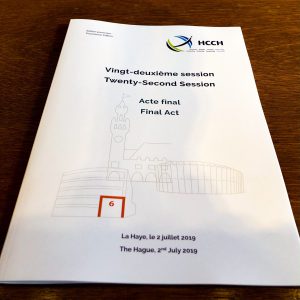Hans van Loon, former Secretary General of the Hague Conference on Private International Law (HCCH), has just published an article entitled “Towards a global Hague Convention on the Recognition and Enforcement of Judgments in Civil or Commercial Matters” in the Collection of Papers of the Faculty of Law, Niš, No 82, Year LVIII, 2019 (see pp. 15-36). The paper develops a lecture held at the Law Faculty.
The author has provided the following summary of his article (emphasis has been added):
The article traces the history of the “Judgments Project”, and provides background on the current negotiations at the Hague Conference on Private International Law, which have resulted in the May 2018 draft Convention, and, it is hoped, will very soon culminate in the adoption of a Convention on the Recognition and Enforcement of Foreign Judgments in Civil and Commercial Matters. To that end, a Diplomatic Session has been convoked at the Peace Palace in The Hague (the Netherlands) from 18 June to 2 July 2019.
The article starts by recalling the interaction between, on the one hand, the 1971 Hague Convention on the Recognition and Enforcement of Judgments in Civil and Commercial Matters and its Supplementary Protocol, and, on the other, the 1968 Brussels Jurisdiction and Enforcement Convention (now: Brussels I recast). The 1968 Brussels Convention drew inspiration both from the 1971 Hague Convention and its Protocol (excluding exorbitant grounds of jurisdiction) and the 1965 Hague Choice of Court Convention. Yet, it went beyond those instruments by (1) providing uniform rules on original jurisdiction; (2) enabling recognition and enforcement generally without review of the original grounds of jurisdiction; and (3) benefitting from a mechanism of uniform interpretation by the Court of Justice of the European Union (CJEU). The success of the Brussels Convention, however, contributed to a lack of interest in the 1971 Convention, which never came off the ground. Other reasons were the 1971 Convention’s alleged discriminatory effect vis-à-vis companies and persons not domiciled in Europe and the issue of bilateralisation – the 1971 Convention required for its operation a supplementary agreement between any two Contracting States, an issue that has come up again in the current negotiations.
In 1992, having considered the possibility of bilateral negotiations with EEC Member States, the USA made a proposal to the Hague Conference for a “mixed” Convention. The idea was that this instrument would provide a list of permitted grounds of jurisdiction and a list of prohibited grounds of jurisdiction, while leaving a “grey area” that would allow Contracting States to establish additional grounds of original jurisdiction and provisions on recognition and enforcement under national law. With the “mixed” Convention idea as a start, negotiations took place between 1996-2001.They ultimately led, via a preliminary draft Convention, to an “Interim text” adopted at a diplomatic conference in 2001. The dynamics of those negotiations were very much determined by the transatlantic dimension, with different, and as it turned out, incompatible strategic objectives (the US being interested in securing recognition and enforcement of its judgments in Europe, and non-discrimination regarding direct grounds of jurisdiction for US-based companies and persons, and Europe, in urging the US to reduce the reach of jurisdiction of its courts regarding Europe-based companies and persons). The resulting text left many issues unresolved, including: (1) (commercial) activity as a ground of jurisdiction (2) the use of the internet, including e-commerce, (3) the protection of weaker parties, in particular consumers and employees, (4) intellectual property (IP), (5) the issue of bilateralisation and (6) the relationship with the Brussels/Lugano texts. It was therefore decided to take a step back, and focus first, separately as with the 1965 Convention, on choice of court agreements.
The article then discusses how the 2005 Choice of Court Convention was able to avoid some of these six major issues, and how it dealt with the remaining ones. Importantly, the Choice of Court Convention found a solution for its relationship to the Brussels/Lugano texts (it also had a substantial impact on the Brussels I recast). In fact, the 2005 Convention provides an important source of inspiration for the 2018 draft, which can be seen, for example, in the definition of its substantive scope, and its provisions on recognition and enforcement, including of judgments awarding punitive damages. However, the coming negotiations are still faced with several of the aforementioned major issues, and some new ones.
Meanwhile, however, the dynamics of the negotiations have changed. Whereas in the past the transatlantic dimension was predominant, the current negotiations have taken on a much more global character, China and other (formerly) “emerging” States having become more actively involved. In some respects, this adds to the difficulty of reaching agreement (for instance regarding IP). On the other hand, the current negotiations are limited to recognition and enforcement only. Yet, indirectly, the difference in approach to judicial jurisdiction between the US – where this is a constitutional matter, with a focus on the relationship between the defendant and the forum (the article discusses recent developments in the case law of the US Supreme Court on international jurisdiction) – and most other States – where the focus is on the relationship between the subject matter of the litigation and the forum – has reappeared in the current negotiations.
The article discusses how this is reflected in the draft, in particular in art. 5, in its provisions on contracts, torts, the internet, intellectual property and consumers and employees.
It is noted, with some regret, that as a result, the torts jurisdiction provision is very limited, indeed even narrower than its predecessor in the 2001 Interim text. It is hoped that the final text will make room for recognition and enforcement of judgments emanating from the court of the place where the injury arose, at least if the defendant could reasonably foresee that its conduct would give rise to the harm in that State. This would be important, for example, concerning civil judgments resulting from cross-border environmental litigation. Regarding IP, the May 2018 draft does not take a firm position, and it even leaves open the possibility of a complete exclusion. That would be a step back in comparison with the Choice of Court Convention, so hopefully it will be possible to avoid such a far-reaching result.
Finally, a number of other, including novel, features of the draft are highlighted. Some concern is expressed about the addition of “situations involving infringements of security or sovereignty of [the requested] State” as a ground of refusal of recognition and enforcement (art. 7 (1) (c)), because that may invite a review of the merits of the judgment, which is in principle, rightly, prohibited (art. 4(2)). Interesting novelties include a provision which gives the requested court a certain flexibility in dealing with judgments that are subject to review in the State of origin (art. 4 (4)); the exclusion of forum non conveniens at the stage of recognition and enforcement (art. 14 (2)), and a tentative provision dealing with “common courts”, such as the future Unified Patent Court art. 4 (5).
The article concludes by expressing the hope that the Convention will avoid the complexity of its 1971 predecessor, notably by avoiding its bilateralisation system, or at least by drafting it in such a manner that it does not make the ratification unattractive or its application unduly difficult. In any event, the Convention will fulfill a long-felt need for a global multilateral framework for the recognition and enforcement of civil and commercial judgments, and thereby contribute to the global transnational legal order.


